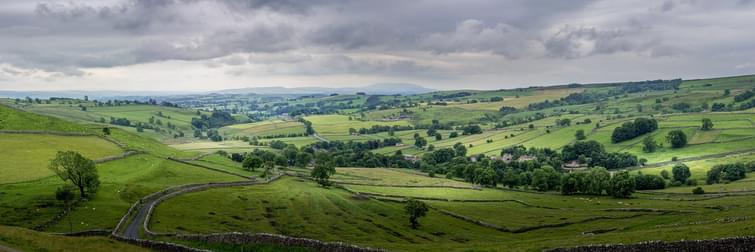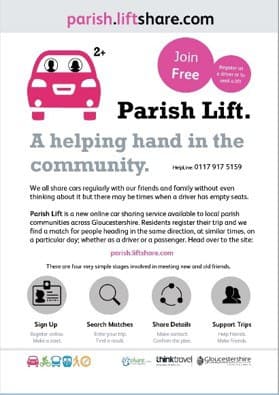
blog: Connecting communities beyond transport
Tuesday 25th September 2018
Influencing mobility cultures and stimulating a step change in travel behaviour is notoriously challenging; especially when factoring in people's different perceptions and expectations on how readily we can get from A to B.
Whilst urban areas have received attention and support for improving the range of travel choices they offer, rural communities have been disproportionately impacted in recent years and people's transport options have generally become more limited. This scenario poses problems, but also presents an opportunity to shape the debate and define the tools required to initiate a positive, holistic cultural change within these communities through initiatives that resonate locally.
So, how did we get to this point and what is being explored to create inclusive access to services and amenities, places of work and people across rural hinterlands? Let’s think beyond transport.
Changing rurality
To understand the challenges facing rural settlements requires an appreciation of how they have evolved over time. Whilst retaining their image as self-sufficient entities, the ‘demographic dynamism’ of rural residents can be linked to the way in which work, services and amenities have been increasingly consolidated and centralised. This is framed within a ‘hypermobile’ society where private car use has come to provide on-demand mobility for most journeys at all times of day. This has fostered habitual travel behaviours through which ‘trip chaining’ is ingrained.
Furthermore, when depicting ‘rural life’, the stereotypical view resembles a close-knit community clustered around shared interests and strong ties to place. Yet, villages and parishes can, in reality, also be relatively dormant commuter settlements with loose social networks and ephemeral contact between inhabitants.
Whilst the implications of mass motorisation are well rehearsed, the parallel decline in rural bus use has impacted on prospective users as well as those most vulnerable to respond accordingly to change.
This has both underpinned, and amplified, a rationalisation of rural bus services across the UK in recent years - with only commercially viable routes remaining in most rural areas. The loss of these services has particularly affected particular demographic and protected characteristic groups, further eroding the range of travel options available to enable them to access social and economic opportunities. The question is, what other options are available?
Changing mobility
Parish Lift, a community car sharing scheme launched across Gloucestershire, seeks to ignite and formalise activities that ‘lend a helping hand’ to neighbours. It uses an emotive ‘localised engagement model’ that seeks to encourage people to voluntarily support the mobility of people in their communities. Emphasis is placed on fostering greater social cohesion and using various virtual and physical communication platforms to provide enhanced, personalised access for inhabitants. This is based on the principle of accepting private vehicles as an integral part of the transport mix, but shaping their use and providing social conditions to support shared journeys. Almost like a form of 'progressive realism' in action.

Whilst casual car sharing activity already takes place within rural communities, the scheme attempts to break down ingrained cultural obstacles to cohabiting cars. These typically arise through safety and security concerns, but can be overcome by operating at ‘village’ scale and embedding a philosophy of ‘sharing’. It relates to limiting the potential impact of loneliness on mental health, to changing shopping behaviours and consolidating trips with neighbours. Anecdotal feedback suggests that simply the exposure of alternative travel options gets people talking initially before realising the opportunities and then the common-sense value of sharing more trips.
Planting the seed
However, transport solutions are a by-product of a tailored and personable promotional model. So how do you go about this in your community?
The Parish Lift Toolkit was designed as a set of easy to read pull-out guides that provide context and the necessary materials for empowering communities to implement their own schemes. Whilst the Parish Lift platform helps find people travelling in the same direction, at a similar time, the localised engagement model, deployed at the ‘origin’ of a journey as opposed to conventional Liftshare schemes, offers a holistic approach that includes:
- Residential Personalised Travel Planning (PTP) on Parish Lift and dissemination of ‘Parish Packs’.
- Local school engagement to initiate poster design and ‘adopt a bus shelter/Parish Point’ competitions.
- Pub-based events and registration days, with local incentives and cross promotion of wider travel opportunities.
- Local travel survey linked to collecting key datasets and developing Neighbourhood Plans.
- Up-skilling residents and cascading information via trained mobile library staff.
- Developing a ‘Library of Things’; a social space for ideas, meeting residents and ‘doing’ workshops.
Crucial to supporting these initiatives is local activism and interest in taking on initiatives and seeking out opportunities to dovetail with existing activities. There are many practical ways in which this can happen; for example, a local pub offering a 10% discount on food and drink to registered car sharers who arrive and display their Parish Lift cards. Village festivals and fetes can also be a good way to engage wider audiences at one time and in one place.
Whilst this may encourage registration (through online promotion and in-house posters), there are many other positive repercussions that can also help evaluate the ‘success’ of a scheme. New technologies available via the platform, enable redeemable points to be amassed when users validate their journeys via a mobile phone application. These can then be spent within local shops and attractions; boosting the local economy and creating a circulatory effect that promotes positive behaviour change and greater local cohesion when aligned with local interests. The scheme becomes self-perpetuating.
Burgeoning ideas
Parish Lift has been deployed in clusters across rural areas that are most-affected by the withdrawal of bus services over recent years, helping those people who planned their weekly activities around local buses. However, scope has been identified to take the model to the next level as part of the wider local transport integration agenda.
As opposed to transport companies and operations competing against each other for custom this focuses on how each travel option can play a specific role in making door-to-door journeys, by effectively allocating resources and providing greater visibility of travel options. This includes exploring ‘hub and spoke’ models, whereby demand responsive and pre-arranged car sharing trips, taxi journeys or Third Sector shuttle services connect into higher frequency, ‘turn up and go’ bus corridors that tend to start on the edge of more urbanised areas.
This may not work for everyone, but it is clear that Community Transport operations could be better harnessed to cover more rural areas through shared booking platforms and databases that automatically direct each request for a mobility service to the best-fit option. This leads to a broader question around improving travel options and access to them, as well as the platform that users can engage with for making pre-arranged and more spontaneous trips across rural areas.
This next step is actually feasible now! Taking inspiration from initiatives across Gloucestershire and working with bus, taxi and third sector operators, community and local authority stakeholders, a number of mobile technology, volunteer ‘banking’ and booking mechanisms are being explored. Where possible these are being aligned to provide a personable, enabling platform that increases the contact and exposure between residents. As such the next chapter of rural mobility is currently being written.
If you would like to know more about Parish Lift, then please get in touch with Sandy Moller who leads ITP's work on this topic.
